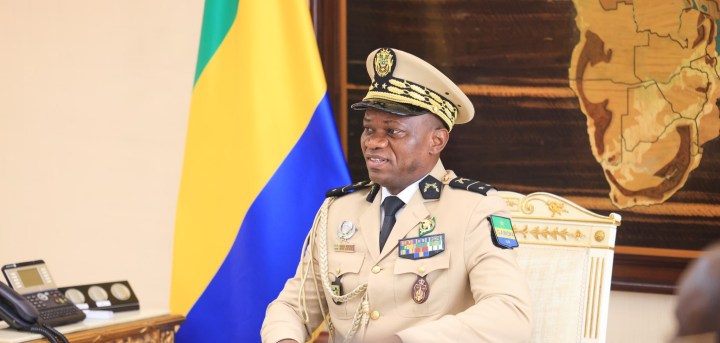ISS TODAY OP-ED
Gabon and the role of political transitions in predicting and preventing coups in Africa

Transitions in Central Africa could become tools to strengthen political and economic governance and avert instability.
In August, Gabon faced a pivotal crossroads when a coup unfolded, marking the end of a staggering 56-year rule by the Bongo family. The dynasty had come to symbolise both political continuity and calamitous governance.
Led by high-ranking Republican Guard officers, the tightly controlled transfer of power swiftly deposed long-standing president Ali Bongo Ondimba. His ousting has ushered in a new era of uncertainty, with a transitional government led by General Brice Oligui Nguema.
Over the years, Central Africa has been marred by political instability and recently, coups, reflecting a region plagued by governance challenges. In this environment, positive political transitions could become proactive tools for consolidating governance and preventing instability and coups.
In Gabon, political, social and economic factors converged to create a volatile climate, leaving the country vulnerable to a power vacuum after Omar Bongo’s death in June 2009. His son Ali Bongo became president after the eviction of his father’s former companions and a contested election in August 2009. Perceptions of political injustice and polarisation followed, heightened by the absence of a transparent and inclusive electoral process and an unstable political system.
Each of Ali Bongo’s three election wins — in 2009, 2016 and 2023 — were disputed. In 2016, protesters set the country’s Parliament building alight after his re-election. Ironically, his main rival was his former brother-in-law, Jean Ping, who previously held high-ranking posts in the elder Bongo’s cabinet. These developments led to widespread political division, increasingly acrimonious rhetoric, violent clashes between political factions and electoral disputes.
The oil-rich nation’s August 2023 election was plagued by complaints of corruption. Although Ali Bongo secured over two-thirds of the vote, the election lacked transparency and legitimacy. During his reign, Ali Bongo was accused of buying off opponents and appointing family members to strategic positions. During the controversial 2023 polls, no international observers or journalists were present, a curfew was imposed, and the country’s borders were closed.
Bongo’s disregard for the rule of law and democracy provided fertile ground for opposition parties seeking change — but also fuelled popular discontent and provided impetus for political upheaval.
Despite its above-average GDP per capita of $17,440, Gabon has high levels of income inequality and poverty. In 2019, 43.5% of the population lived below the poverty line — the fourth highest poverty rate among Africa’s upper-middle-income economies. Unemployment is high, with 40% of young people out of work in 2020.
Gabon’s economic downturn, driven by fluctuations in oil prices, has undermined the government’s ability to provide for its citizens. As the economy weakened, the government struggled to maintain public support, and corruption scandals further eroded the population’s trust.
With this type of governance in place for 57 years, the conditions were ripe for social unrest and an unconstitutional change of regime.
Coup red flags
Preventing political instability and coups in Central Africa largely hinges on identifying and responding to warning signs timeously and effectively — and Gabon’s experiences provide valuable insights.
The country’s new Transition Charter lays the groundwork for democratic reform. Its emphasis on democratic ideals, human rights and good governance shows a willingness to address past difficulties and construct a more stable and democratic future. New values such as patriotism, accountability and inclusivity indicate a shifting political environment that emphasises openness and dialogue.
Properly implementing the charter will be critical and requires collaboration among all stakeholders and adherence to the document’s principles. Gabon’s political environment is changing, and the charter represents a key component of that development.
However, it is silent on two crucial issues: the president’s eligibility for the next elections and the duration of the transition. This is creating tensions that could worsen if the national dialogue scheduled for next April doesn’t settle these issues.
The political situation in Gabon before the coup is similar to that of many Central African countries. Regimes have been in place for decades without alternation, and economic governance doesn’t always meet the people’s aspirations.
In these contexts, transition agendas could be used to reset political systems and avert instability. Countries such as Gabon and Chad should use their transitions proactively to improve political and economic freedoms, and address underlying popular grievances. More than two years into its transition, Chad has made little progress, but Gabon could do better.
Using political transitions as a tool to prevent coups offers the prospect of long-term stability, reconciliation and regional cooperation. To succeed though, political transitions must be repositioned towards coup prevention. Such an approach — involving diplomatic, political and security measures —is imperative for Central Africa and needs the support of the Economic Community of Central African States (Eccas).
The African Union (AU) can assist by ensuring that the political transition in Gabon and those across Central Africa lead to long-term stability and resilience against coups. In Gabon’s case, the AU and Eccas can mediate conflicts and promote dialogue to address grievances and foster reconciliation. Both organisations should deploy election observer missions to establish the new government’s legitimacy and prevent further political crises.
Gabon’s case can guide Eccas in promoting democratic transitions that enable Central Africa to find a road to peace and stability. DM
Remadji Hoinathy, Senior Researcher, Central Africa and Great Lakes and Nirvaly Mooloo, Intern, Institute for Security Studies (ISS).
First published by ISS Today.
















Comments - Please login in order to comment.